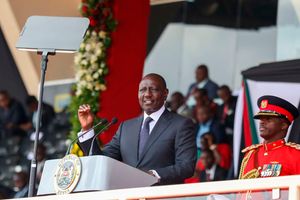Premium
Why Treasury faces pressure to restructure part of Kenya’s debt load

National Treasury Cabinet Secretary Njuguna Ndung’u at Parliament Buildings for the reading of the 2023/24 Budget Statement on June 15, 2023.
Kenya could spend up to Sh5 billion daily on public debt service in the current financial year should it fail to restructure the public debts maturing in the current fiscal year 2023/24.
The government projects public debt service costs to rise by 30 per cent to Sh1.8 trillion in the 2023/24 financial year from Sh1.38 trillion in the period ended June 30, underlining the burden President William Ruto faces as he plans to implement his Sh3.68 trillion budget.
This means that, without a re-financing of some of the principal debts maturing in 2023/24, debt service could form half of the government’s Sh3.68 trillion planned expenditure during the entire year, or 70 per cent of the Sh2.57 trillion taxes Treasury projects to collect from the economy, which would imply spending Sh70 for every Sh100 collected from taxpayers to settle the public debt.
This puts the National Treasury under heavy pressure to restructure some of the public debts that mature in the year starting July 2023 to lengthen their repayment period and possibly re-negotiate favorable interest rate terms, to avert the current pressure and rescue the government from a halt of public services for lack of monies.
Of the projected debt service costs, Sh780 billion constitutes interests, which are mandatory payments and which could rise further should the local currency continue depreciating.
This will leave the government spending 30.3 per cent of the taxes it collects (or Sh3 in every Sh10 taxes collected) to pay interest on loans from domestic and external lenders.
Interest payments, which the government must pay, will be equivalent to Sh2.1 billion daily. The interest costs for the government have risen by 14.2 per cent from the estimated costs of Sh682.8 billion in 2022/23, which averaged Sh1.87 billion daily.
Principal loan repayments are projected at Sh1.02 trillion, having risen from the estimated Sh702.2 billion redemptions in 2022/23. The government, however, has the room to negotiate lengthening of these payments with lenders, which would reduce the pressure on debt repayment costs.
The debt service costs sound more pressure for the government as it enters the new financial year, even as it faces dwindling revenues as the Kenya Revenue Authority (KRA) struggled to achieve the targets in the ended financial year.
Kenya’s public debt hit Sh9.29 trillion in March, even as debt service costs rose by 27.5 per cent in the nine months to March, according to the Controller of Budget (COB).
“Total expenditure on public debt amounted to Sh831.03 billion, compared to Sh651.73 billion recorded in a similar period FY 2021/22,” the COB observed in the report on national government spending between July 2022 and March this year.
“The expenditure comprised Sh393.17 billion towards principal redemptions, Sh436.64 billion towards interest payments, Sh1.07 billion for commitment fees, and Sh156.09 million for other charges,” COB Margaret Nyakango stated.
Already, the 2023/24 budget delivered by Treasury Cabinet Secretary (CS) Njuguna Ndung’u two weeks ago has a Sh718 billion deficit, expected to be financed through Sh131.5 billion external borrowing and Sh586.5 billion domestic borrowing, which grows the public debt further.
“The rising interest rates both in the domestic and external market has an implication on the Governments` overall debt service. A large proportion of revenue will be used to service debt while denying Kenyans other priority expenditures,” stated the the 2023 Budget Policy Statement (BPS).
CS Ndung’u while delivering the budget speech on June 15 indicated that the government was already considering the re-financing of a $2 billion Eurobond which matures next year.
“The external debt service is projected to increase to Sh475.6 billion in the financial year 2023/24 from Sh242.1 billion in the fiscal year 2022/23, mainly reflecting redemption of the $2 billion Eurobond (approximately Sh241.8 billion).
In preparation for the redemption of this maturing bond, the National Treasury issued an expression of interest to bring onboard a Lead Manager to advise the Government on liability management options towards the resolution of the Eurobond 2024,” Prof Ndung’u stated.





